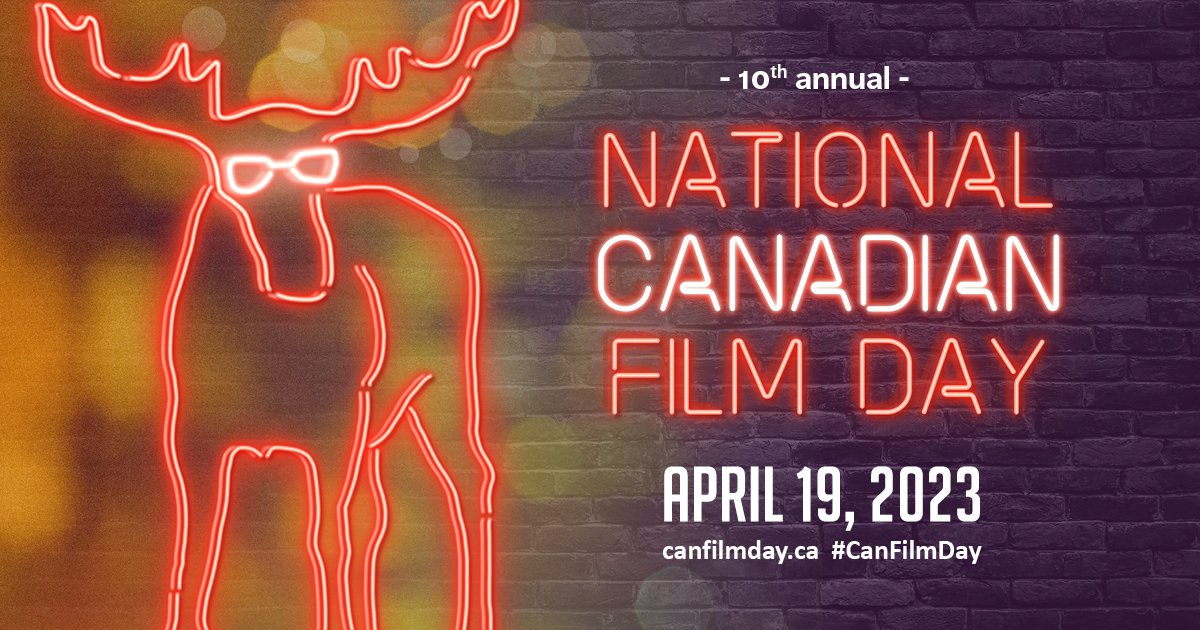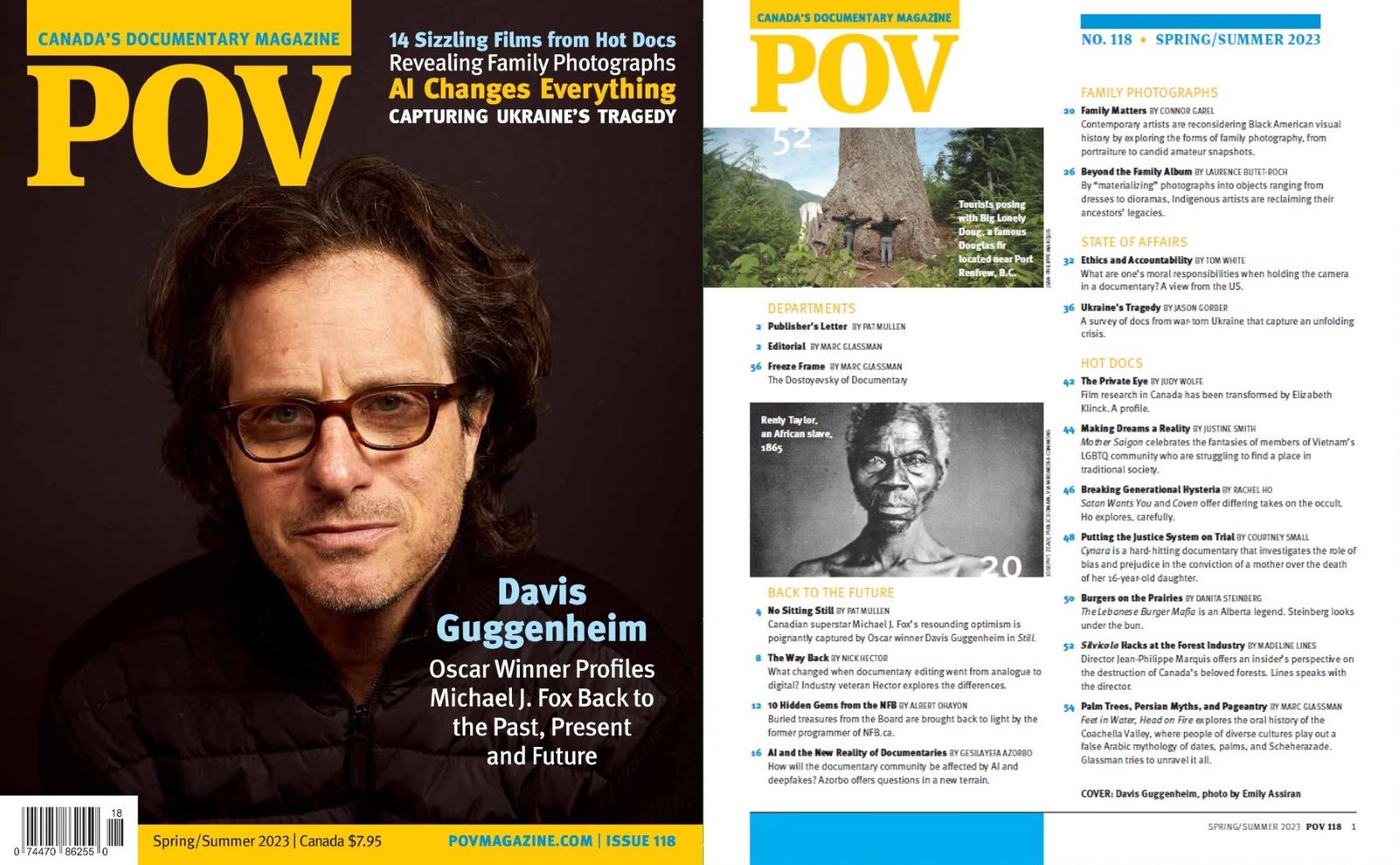This year marks the tenth anniversary of National Canadian Film Day. CanFilmDay was launched in 2014 by Reel Canada, and has brought together films, filmmakers, and audiences from coast to coast to salute our homegrown cinema every year since. This year’s event has screenings all over Canada and around the world. (Find local screenings here.) With many more promising debuts on the horizon, it’s worth taking a moment to look back on all the triumphs our filmmakers have shared with the world of documentary throughout the decades. Here are ten of great Canadian docs to help mark ten years of National Canadian Film Day!
In no particular order, here are some National Canadian Film Day streaming picks:
Self-Portrait (dir. Joële Walinga, 2022)
Self-Portrait is Canadian filmmaker Joële Walinga’s second feature documentary. This past year, it challenged viewers across a series of festivals, winning the Special Jury Prize for National Feature at the Montreal International Documentary Festival (RIDM) in 2022. The film offers a series of seemingly disjointed, mundane sequences drawn from public-access surveillance cameras around the world. Walinga’s collected footage wanders through what seems like the linear progression of a year: Starting in the icy depths of winter, the film patiently witnesses a warm turn to springtime, then into the summer, and so on. With no accompanying narration, viewers are left to their own devices to draw what they may from the hour-long piece. To quote Rachel Ho’s review for POV: “Depending on where your mind takes you while viewing the film, Self-Portrait can be poetic, boring, odd, analytical commentary, and everything in between.” Regardless of one’s reaction, this film offers a forward-facing, innovative contribution to Canada’s documentary tradition. -Ry Pembroke
Watch it on MUBI. [Get a free trial via POV!]
Black Mother Black Daughter (dir. Sylvia D. Hamilton, Claire Prieto; 1989)
Poet, filmmaker, and artist Sylvia D. Hamilton’s body of works across mediums captures and honours the long-standing legacy of African Nova Scotian communities across the island. Black Mother Black Daughter, directed with Claire Prieto, offers an intimate gaze into the lived experiences of Black women in Nova Scotia; navigating through their daily lives, and their contributions to home, family, and community. Exploring the vast expanse of the Black experience in Nova Scotia, the film feels celebratory, bookended with a song honouring the tenacious relationships between mother and daughter, sister, and community member, that make up the foundation of the Black community in Nova Scotia. –RP
Watch it for free via NFB.ca:
Black Mother Black Daughter, Sylvia Hamilton & Claire Prieto, provided by the National Film Board of Canada
Nahanni (dir. Donald Wilder, 1962)
Donald Wilder’s short documentary Nahanni follows explorer and prospector Albert Faille in his repeated search for a legendary gold mine down the South Nahanni River in Northwest Territories. Faille has continuously attempted the journey for the fabled gold since 1929. As Wilder intervenes with a camera, the narrative finds itself in the abundant folklore and legends generated by the treacherous expedition that is the South Nahanni. Wilder’s depiction of Faille offers a portrait of dedication and obsession that situates viewers in the ongoing gold-craze that characterizes this moment in Canadian history. –RP
Watch it for free via NFB.ca:
Nahanni, Donald Wilder, provided by the National Film Board of Canada
My Winnipeg (Guy Maddin, 2007)
In a 2007 feature for POV, Guy Maddin writes: “To those who fly over it, Winnipeg, the city of my birth, is a small charcoal smudge of a populace upon the great white Canadian plains of snow, a city too easily overlooked, or forgotten completely. To me, Winnipeg is a supernatural city of enchanted palimpsests, stories and memories piled on top of one another.” Oft referred to as a “docu-fantasia,” Maddin’s award-winning film challenges the comfortable constraints of traditional documentary filmmaking. The film sifts through piled stories and memories through fictionalized episodes narrated by Maddin’s characterization of himself. In My Winnipeg, Maddin expands the documentary consciousness to consider the value of situated, personal narratives. Released originally in 2007, My Winnipeg has stood the test of time, becoming widely acclaimed as one of the greatest Canadian films of the decade, and in the case of the most recent industry poll by TIFF, of all time. -RP
Watch it on DVD and Blu-ray.
Buffy Sainte-Marie: Carry it On (dir. Madison Thomas, 2022)
For Madison Thomas’ first feature, she took on the daunting task of capturing the life and legacy of Cree singer-songwriter, activist, and cultural icon Buffy Sainte-Marie. In an interview with POV back in September, Thomas says, “A big part of Buffy’s story is that it was [often] not shown through her lens. She was really limited in terms of her authentic voice for so long, the story was skewed for so long.” While Thomas interjects with deeply researched history and lesser-known details, she ultimately lets Sainte-Marie’s story stand for itself. Other Canadian legends like Joni Mitchell, Alanis Obomsawin, and Robbie Robertson offer memories, and praise, and help reify Sainte-Marie’s story. Buffy Sainte-Marie: Carry it On is for all touched by the legacy of the incredible Canadian icon. –RP
Watch it on Crave.
Kímmapiiyipitssini: The Meaning of Empathy (dir. Elle-Máijá Tailfeathers, 2021)
Writer, director, producer, and actor Elle-Máijá Tailfeathers made waves in 2021 with her feature documentary Kímmapiiyipitssini “a Blackfoot teaching that essentially means to give compassion, to have empathy,” Tailfeathers explains in a 2021 interview with Hot Docs. “It upholds empathy as a survival mechanism, as a way for our people to move forward together, and it’s one of the ways that we’ve survived genocide[…]”. The film offers a sobering window into so-called Canada’s colonial project, which has led to a substance abuse crisis with deep ramifications in Tailfeathers’ Blackfoot community of the Kainai First Nation. Witness the tireless work of community members, first responders, and health professionals as they work toward holistic harm reduction measures for Blackfoot people, as well as the ways that Tailfeathers commits to Kímmapiiyipitssini as her guiding principle to filmmaking with care. – Audrey Chan
Watch it for free via NFB.ca:
Kímmapiiyipitssini: The Meaning of Empathy, Elle-Máijá Tailfeathers, provided by the National Film Board of Canada
Pen Point Percussion (dir. Norman McLaren, 1951)
Before Norman McLaren’s Oscar-winning Neighbours (1952), there was Pen Point Percussion. Equal parts spellbinding and playful, this doc is his instruction manual on the hand-drawn sound processes underscoring some of his more experimental, animated shorts, like Dots (1940) and Loops (1940). Follow as McLaren pulls back the curtain on analogue, tactile filmmaking and blurs the lines between sight and sound. Guaranteed to put a smile on your face. -AC
Watch it for free via NFB.ca:
Pen Point Percussion, Norman McLaren, provided by the National Film Board of Canada
Stories We Tell (2012, dir. Sarah Polley)
What are the stories that make up a family? Recent Oscar winner Sarah Polley pieces together answers through home movies, photographs, and interviews, diving into the secretive story lived by her mother. Stories We Tell weaves us through a Rashomon-esque patchwork of contradicting memories and materials belonging to a complex network of relatives, friends, and strangers. It’s a doc that invites questions about our construction of the past, present, and future, both when it comes to our lived realities and the powerful role that cinema plays in them. -AC
Black Ice (dir. Hubert Davis, 2022)
Black Ice –– part of TIFF’s official selection in 2022 –– is Oscar-nominee Hubert Davis’ latest documentary. The film affords us an incisive look into the contributions of Black hockey players in so-called Canada that predate the NHL, presenting a candid survey of the systemic racism still deeply embedded in the sport. Davis gathers an impressive roster of players from leagues major and minor to share their unfiltered testimonies in the name of loving the game. – AC
Watch it on Crave.
Paperland: The Bureaucrat Observed (dir. Donald Brittain, 1979)
An NFB classic, Donald Brittain’s Paperland remains relevant as ever as it unravels the absurdities of bureaucracy in so-called Canada and beyond. Stylistically tongue-in-cheek, Paperland rests its critical gaze on the faceless administrators carrying out the many irrational tasks that uphold our systems tied up in red tape. With this doc, Brittain makes the impossible possible, reframing one of the most tedious topics as one that’s poignant, yet still endlessly entertaining. –AC
Watch it for free via NFB.ca:
Paperland: The Bureaucrat Observed, Donald Brittain, provided by the National Film Board of Canada
Bonus Anniversary short!
Anniversary (prod. William Weintraub, 1963)
Ever wonder about the role of Canadians in early Hollywood? The NFB short Anniversary unpacks Canuck contributions to the formative years of filmmaking. Host Walter Pidgeon takes audiences through “Canada’s walk of fame” who made a mark on the Sunset Strip. Among the who’s who of Hollywood icons is “America’s Sweetheart” Mary Pickford, who made history as the first Best Actress winner, along with Norma Shearer and Marie Dressler, who scooped the prize the next two years to give Canadians three consecutive wins in the category. Maybe it’s time for an update featuring recent Oscar winners Sarah Polley, Daniel Roher, and Domee Shi? – POV
Watch it for free via NFB.ca:
Anniversary, , provided by the National Film Board of Canada











